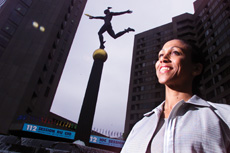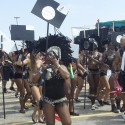From the Playing Field to the Office
By Shannon Boodram
Before Scott Neil, 27, quit courting basketball at age 25, he had played on a scholarship in Cleveland and semi-pro in Canada. But a low salary and the painful toll on his joints forced Neil to retire at half the age that most people plan to. To boot, there was no pension to tide him over and Neil immediately needed another way to survive outside of the only profession he had ever considered.
“I was always told to think of a plan B, but when you truly love a sport, it consumes your mind,” says Neil. “It’s not until you get hurt or you get older that you start thinking that you have to consider another way.”
Charmaine Crooks sits at the desk of her NGU Consultants office in Vancouver and reflects on the day she made the call to hang up her spikes. After an incredible career in track and field, during which Crooks became a five-time Olympian, Pan American gold medalist and flag bearer at the Atlanta Centennial Olympic Games’ opening ceremonies, she knew it was time to move on. But, unlike Neil, she knew exactly where she was moving next.
“I started my own consulting company four years before retiring,” says Crooks, who attributes her foresight to her psychology degree from the University of Texas at El Paso where she learned about depression in ex-athletes. “When I retired in 1997, I just transitioned right into working full time on my business.”
Crooks’ sports marketing and corporate consulting company is a blissful marriage of the two things she knows best: the business of sport and the art of competition. Her positive attitude towards hard work and wanting to be involved in various offshoots of the sporting business even earned Crooks a place on Canada’s Top 50 Women of Power list in 2004. Her enthusiasm also led her to several nonprofit initiatives and committees, including the International Olympic Committee where she became the first Black woman to serve on the board.
“I fear a lot of athletes don’t think beyond the traditional roles after retirement,” says Crooks. “The business of sport is a deep well that extends far beyond entertainment. There is marketing, sports infrastructure, consulting and coaching. As an athlete, you can’t be afraid to ask questions.”
Two years after Neil’s retirement, he began a business venture in social media but admits that he “can’t watch basketball anymore.” For many athletes, their competitive history is a painful reminder of unfulfilled potential rather than a launching pad for new ventures. In Crooks’ new book, slated for release just before the 2012 London Olympics, she illustrates the rewarding life that athletes can lead if they never lose their dedication to sports and lust for new challenges.
Excellent networking and plenty of preparation may make Crooks’ charmed post-athletic career seem fantastical, but those who think her success came easy are missing the true moral of her story. “If you’re not passionate and not having fun, don’t do it because nothing will seem to come easy.”








Leave your response!